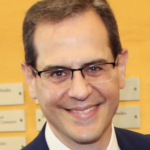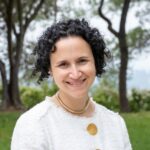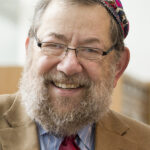Kaplan was fond of the phrase a “Copernican Revolution” and used it in several different contexts. When one’s understanding of Judaism shifts from that of a religion to a culture or religious civilization, does one’s understanding of who is an educated Jew correspondingly shift? If so, how?
From Dr. Jon A. Levisohn

A Kaplanian Vision of What Jews Ought to Know
January 2024
“Judaism as a Civilization,” Rabbi Deborah Waxman reminds us, “was about legitimating multiple ways of being Jewish.” That, it seems to me, is the starting point for thinking about a Kaplanian vision of what Jews ought to know: The disruption of the idea of an eternal core of Jewish beliefs and practices, in order to emphasize—and as Waxman says, legitimate—the heterogeneity of those beliefs and practices.
To be sure, there are some practices that have characterized Jewish life in most times and places. Likewise, there are some texts that have served as authoritative for Jewish communities in most times and places. Those historical patterns deserve careful consideration. But Kaplan would caution us against drawing incorrect conclusions from those patterns, conclusions that would flatten out the diversity and multiplicity of forms of Jewish culture.
So if Judaism is an evolving civilization, then towards what set of beliefs and practices should we educate? There are four options.
One option is to double down on essentialism. It may be true that Judaism is an evolving civilization, but surely there are some practices or texts that are at the core. Our educational efforts should focus on those.
However, if we take Kaplan seriously, this will not do. Every proposal for a transhistorical essence of Judaism fails. As an argument for promoting a particular practice or idea to students, we cannot simply affirm that lots of Jews in the past have enacted this practice or believed this idea.
A second option is to swing in the opposite direction, to embrace any and all expressions of Jewishness and Jewish practice, historical and contemporary—that is, to be as non-normative as possible. It’s all good.
But education is inevitably a normative business. We have to make choices about what to include and what to set aside, and especially, about what to aim for. “It’s all good” is no way to design an educational program with intentionality and aspiration.
A third option, which avoids the pitfalls of the first two, is to focus on Jewish cultural capital. According to this approach, the purpose of education is to provide the student with the autonomous capacity to navigate Jewish cultural spaces. Therefore, we have to focus on the things that are distinctively suited to provide that autonomous capacity. What Jews ought to know, therefore, is whatever, in the current condition of the evolving civilization of Judaism, holds cultural value.
There is surely value to this approach, and I have advocated for a version of it myself elsewhere. But it now occurs to me that it is not yet fully Kaplanian. Metaphorically, we may be opening up the beit midrash to more people, but we are still assuming that the beit midrash and its texts are at the center of Jewish life. We are therefore not yet fully embracing the diversity of Jewish civilization.
A fourth option, then, is to proliferate the languages of Judaism beyond the textual. But unlike the second option above, we have to do so in a way that embraces the challenge of normativity. What, then, is the normative criterion? What should Jews know? The criterion is the future, i.e., the future health and vitality of the Jewish community. Kaplan calls on us to notice the evolution of Jewish civilization, but not to be mere observers. Jews should know whatever they need to know to be contributors to Jewish civilization and producers of Jewish culture. As educators as well as participants, we have to take responsibility for that evolution.
From Miriam Heller Stern, PhD

To Be a Co-Author of the Jewish Story
January 26, 2024
For centuries, Jews have survived, adapted, and flourished against all odds. The Jewish story is one of creative overcoming, of rebuilding and self-renewal. What does it take to become an active co-author of this unfolding dramatic story?
“To be trained as a Jew should mean to be given the habits that would help one function creatively in all of life’s situations,” Mordecai Kaplan wrote in Judaism as a Civilization. Learning to be a Jew is learning to live, think, choose, and create, by applying Jewish wisdom in a dynamic world that demands creativity to outlast the tests of history.
What is does it mean to “function creatively?” Jewish creativity is manifest in the ability to produce chidushim – novel ideas, insights, and interpretations. It is the generation of culture, through new recipes, melodies, languages, poetry, ritual objects, stories, humor, customs, and family traditions under a variety of circumstances to nourish and sustain us as individuals, families, and communities. It is strategizing and problem-solving, responding to threats and applying wisdom to navigate new circumstances.
Kaplan defined creativity as “the result of whole-souled and organic reaction to life’s values; and a reaction in which senses, emotions, imagination, intelligence and will are fully aroused” (p. 486). This view is mirrored in contemporary research in the field of affective neuroscience that suggests that the cognitive and affective processes of the brain are naturally co-dependent and integrated. The ability to engage in “whole-souled” thinking about our values and surroundings is essential if we are to participate meaningfully in the ongoing process of creation itself. Through this type of deep, holistic engagement we can focus on becoming better humans and improving society each day. Everyone has the potential to participate.
By recasting the discourse around thinking instead of knowing, we transcend a conventional conception of Jewish “knowing” that is limited to accumulating a body of knowledge or literacy. While wisdom is at the core, creative thinking demands habits of generativity, ingenuity, interpretation, resilience, and empathy. It is not meant to be a lonely or competitive enterprise; the fate of the Jewish people relies on collaboration, combining talents and thinking together, as a community.
We cannot take for granted that progress is linear, that societies will become stable or predictable, or that existential threats to Jews, Judaism and humanity – be they internal or external – are only a theme of history. Our systems for perpetuating Jewish literacy – namely the enterprise of Jewish education – must take seriously Kaplan’s charge that we center creativity as an aspiration.
From Dr. Arthur Green

Who is an Educated Jew
January 2024
“Who is an educated Jew?” The question seems so deceptively simple. In earlier eras, it did seem to have a simple answer. One who could swim skillfully in yam ha-talmud, the “sea” of the Talmud, or of traditional Jewish learning as a whole, in the original Hebrew and Aramaic of the sources, was considered a knowledgeable Jew. But today that is patently inadequate as a definition. How much does one need to know about the Holocaust? About Israeli popular music? About Yiddish literature? The history of Zionism? American Jewish cooking? None of those vital parts of Jewish existence – and many more like them – fit into the old categories.
But beyond that, we need to recast the question in the context of our digital age. So much of what those classical scholars achieved involved feats of memorization and access to sources, matters that can now be handled by the ever-growing tools of artificial intelligence. Possessing a great store of knowledge about Jewish subjects will be significantly less important or impressive in the future than in earlier ages. (Pharaoh will be able to say: “My robots can do that trick too!”)
This change may help liberate us to read the initial question differently. That word educated is the key. What does it mean to be educated about being a Jew, or to have been educated by the fact of one’s Jewishness? “Education” in English bears within it some of the same sense as Bildung in both German and Yiddish, the formation or cultivation of the self through exposure to the treasures of a cultural setting and tradition. I think of the Hasidic tale that concludes with the punchline “It’s not about how much Talmud you’ve gone through, but rather about how much of the Talmud has gone through you.”
Jewish education, then, is about being shaped by the Jewish experience. This includes life and schooling in an intensely Jewish community. That is one where Jewish teachings, values, patterns of living, ethnic concerns, languages, and so forth are the stuff of daily living. I can picture such cultivation in a Chabad setting in Los Angeles, on a secular kibbutz that has introduced more Judaism in ‘Emek Yizre’el, and various places in between. In a secularized context, it is easier to picture in Mexico City or Paris than in the US, where the assimilatory pressures are strongest and the choices of identity popular among the youth are least shaped (for those of fair complexion) by ethnic origins.
This cultivation of the educated self, and around it the Jewish family and community, will necessarily take multiple forms in our highly diverse community. We still need a place for the traditional talmid hakham, the one who has that mastery of the ancient sources, including, but not limited to, the legal texts. So, too – perhaps even more urgently, from my point of view – the neo-Hasidic scholar with deep reach into the sources of Jewish spirituality, who can translate them into the language of today’s many seekers. But so too those steeped in Jewish history and memory, in literary/artistic creativity, and other rich sources of Jewish roots. אלו ואלו דברי אלוהים חיים.
Tosafot (additional commentary) by Rabbi Lily Solochek
Rabbi Lily Solochek, Reconstructing Judaism
The Answer is in the Question
At the center of centuries of Jewish thought and writing are questions. Whether we look to the vast discussions of the Talmud, to the Four Questions on Pesakh, or even to debates in contemporary Jewish life, Jews anchor themselves with questioning. The how and the why are just as important, and often more important, than the what. Rabbinic literature, modern Jewish philosophy, and contemporary Jewish thought would not exist if not for our persistent drive to ask questions.
Perhaps the question is not what an educated Jew knows, but what an educated Jew asks.
As a Jewish educator, my first goal for students encountering Jewish text, tradition, or culture is to ask questions. Sometimes we find the answers, sometimes we do not. The students’ questions are an insight to how Judaism exists in their own lives, minds and hearts.
By embracing and welcoming questions, we model interacting with Judaism in real time, encountering how our civilization has changed over the millennia. Students have a lifetime to explore Jewish culture and religion; we have the opportunity to plant the seed of curiosity and be exemplars of our tradition’s proclivity for questions.
We can start with the most basic question, the Simple Child’s inquiry at the Seder: What is this? We can ask how these rituals, traditions, recipes and stories give deeper meaning to our lives. We can ask why we continue to engage with Judaism in a world that grows increasingly secular, and how Jewish civilization continues to sustain our people around the world. We can ask why and how. As educated Jews, they should never feel they have reached the end of their learning journey, but rather they should continue cultivating their own curiosity and never stop inquiring.
As our world continues to evolve around us, so must our questions.
Tosafot (additional commentary) by Dr. Miriam Heller Stern
Dr. Miriam Heller Stern
Jewish Creativity: An Essential Aspiration for Jewish Education
Gemara author Dr. Miriam Heller Stern expands on her vision of how the arts inform what it means dive deeply into Kaplan’s understanding of the arts and their role in Jewish civilization, working out of the inspiration of Kaplan’s approach to the arts and Jewish Civilization.
